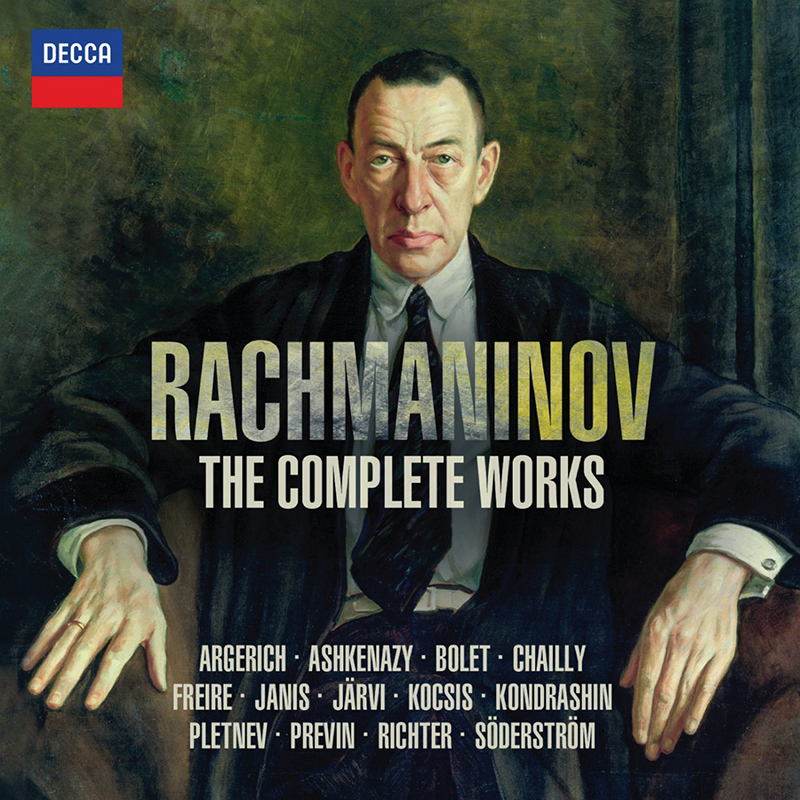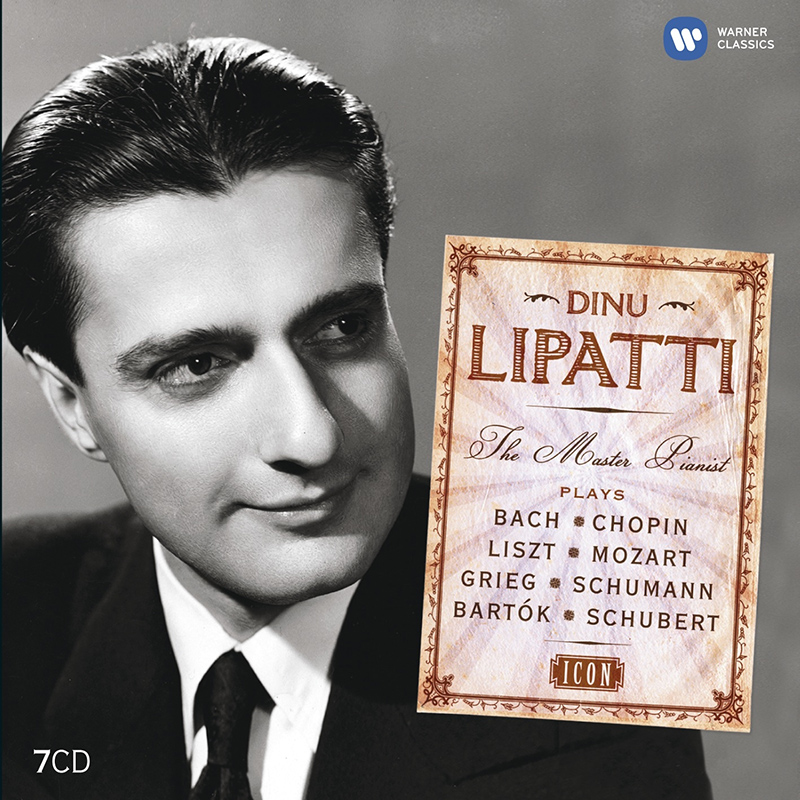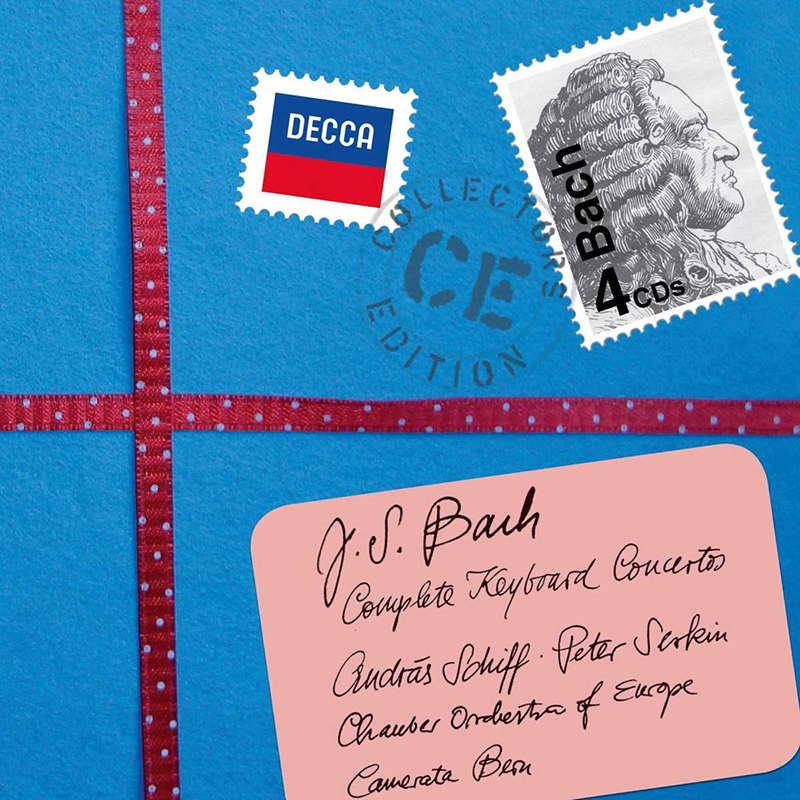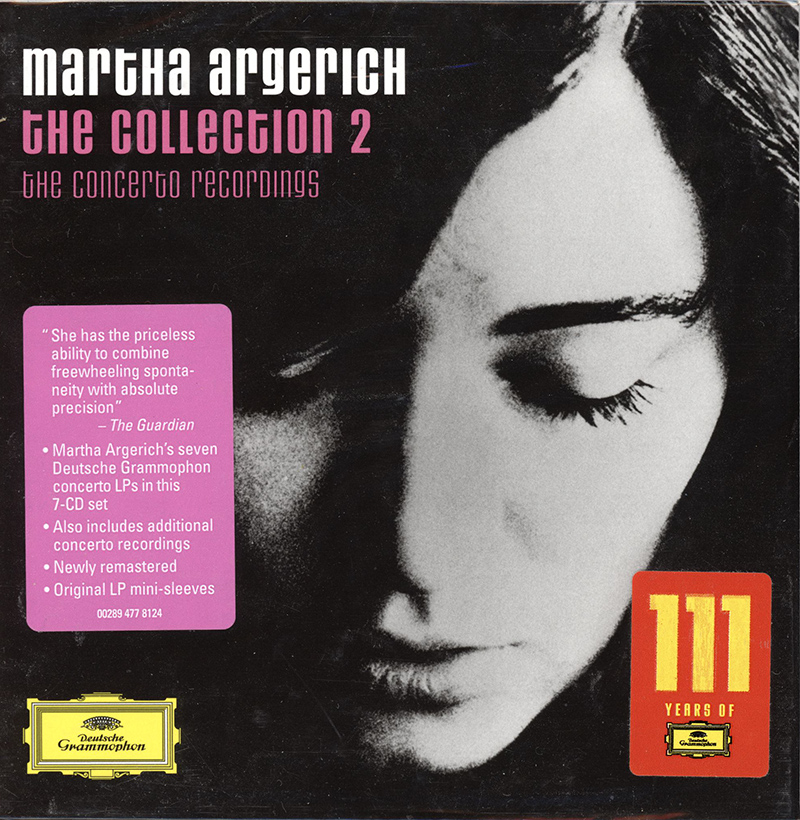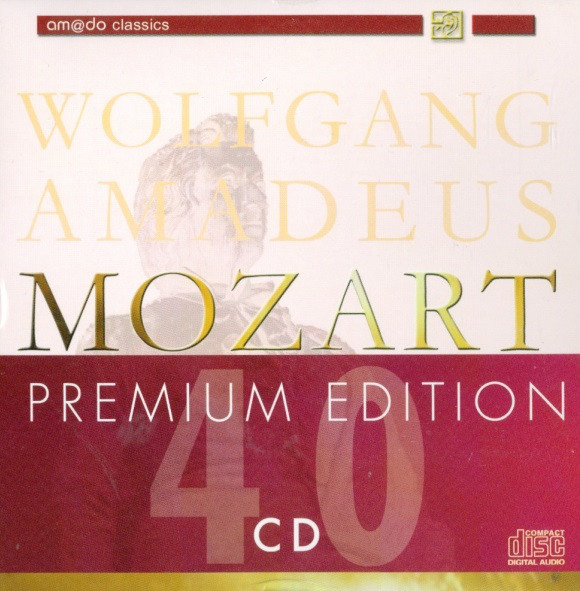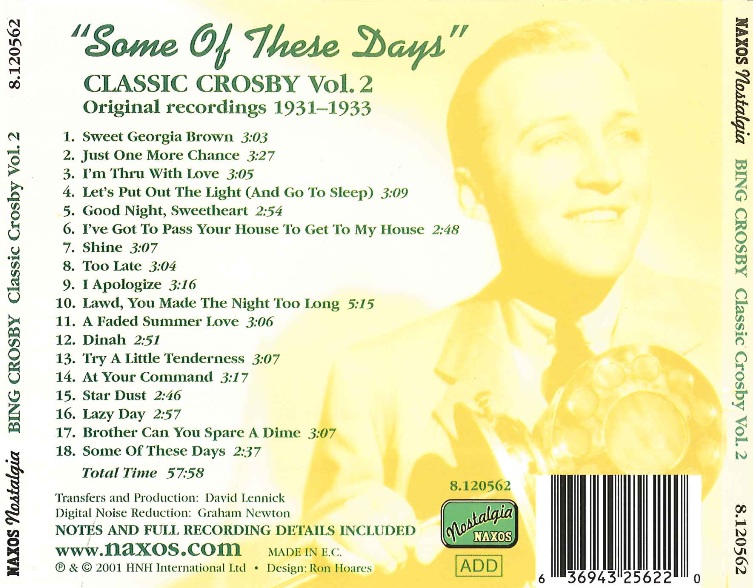Logowanie
KOLEKCJE!
BACH, CHOPIN, LISZT, MOZART, GRIEG, Dinu Lipatti, Otto Ackermann, Ernest Ansermet
The Master Pianist
PROKOFIEV, CHOPIN, TCHAIKOVSKY, SCHUMANN, BEETHOVEN, Martha Argerich, Claudio Abbado, Giuseppe Sinopoli
The Concerto Recordings
The Collection 2
Jakość LABORATORYJNA!
ORFF, Gundula Janowitz, Gerhard Stolze, Dietrich-Fischer Dieskau, Deutsche Oper Berlin, Eugen Jochum
Carmina Burana
ESOTERIC - NUMER JEDEN W ŚWIECIE AUDIOFILII I MELOMANÓW - SACD HYBR
Winylowy niezbędnik
ClearAudio
Essence MC
kumulacja zoptymalizowana: najlepsze z najważniejszych i najważniejsze z najlepszych cech przetworników Clearaudio
Direct-To-Disc
PIAZZOLLA, ChamberJam Europe
Tangos del Ángel y del Diablo
Direct-to-Disc ( D2D ) - Numbered Limited Edition
Bing Crosby
Some Of These Days - Vol.2
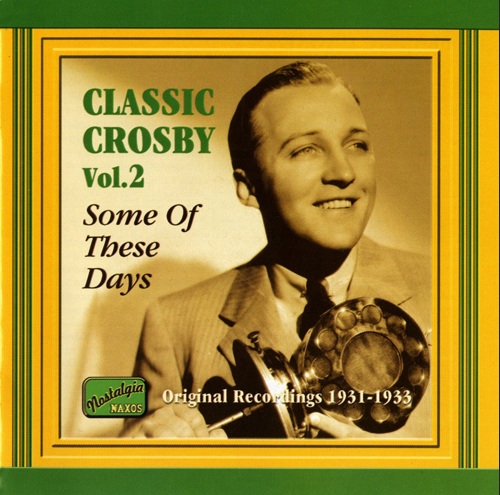
- Bing Crosby - vocal
Original Recordings 1931-1933
"The world’s most popular entertainer during the first half of the 20th century, Bing became America’s Number One best-selling chart-topper through a fortuitous combination of circumstances. He had, first and foremost, a confidential, personable approach to a song and a marketable charisma which lent itself to the microphones of the electrical recording process in use from the late 1920s onwards. His intimate crooning style was also suited to radio, which was at that time the predominant entertainment medium, he went into films (here his acting was at first barely competent, but steadily improved) and he recorded, some might say indiscriminately, the latest song titles, dozens of which became smash hits. He was, therefore, either (to coin his own word) "lucky" or at least chronologically ideally placed to exploit the trend that Gene Austin, Cliff Edwards, Nick Lucas and the other crooners had started. Harry Lillis Crosby was born in Tacoma, Washington on 2 May 1903. The musical product of a respectable, middle-class, part-Irish American family, he had inherited the Celtic instinct for song, an impulse fed and watered by the Victrola, on which he savoured the plangent tones of McCormack – as well as ragtime and, a little later, his jazz heroes Bix Beiderbecke, Joe Venuti and Paul Whiteman (1890-1967). A keen drummer in his school days, while at Gonzaga University in Spokane, Harry also provided vocals in the college combo, where he found a kindred spirit in his fellow lawstudent Al Rinker (b. 1907). Their musical tastes coincided (attuned to jazz, they sang duets in scat) and they gelled. Moreover, their mutual ambition for a career in music was aided by Al’s sister, the blues singer Mildred Bailey (1907-1951) who was conveniently placed to secure them an entrée to Whiteman’s outfit where, with pianist-songwriter Harry Barris (1905-1962), they formed the Rhythm Boys. Bing remained with Whiteman for more than three years. He recorded his first solo vocals with Whiteman’s band and made his film début with them in 1930, in King of Jazz. Then, after a stint with Gus Arnheim in Los Angeles (and his first US chart hit recordings with that band for Victor – "I Surrender, Dear" at No. 3, "Wrap Your Troubles In Dreams" at No.4 and "Just A Gigolo" at No.12) he got a CBS radio contract and a Brunswick recording contract and, by the close of 1931, was fully launched as a soloist. Between 1931 and 1939 alone, Bing produced more than 150 charted hits, which included twenty-two No.1s and fourteen No.2s. Through his prolific output of recordings and subsequent film appearances he became a household name the world over and the all-embracing list of titles in his discography now reads like a virtual popsong panorama of the decade. Bing’s first No.1, Johnny Green’s "Out Of Nowhere" (April 1931), was followed in June by another with "Just One More Chance" (a revival of a 1928 song by the New Yorkborn composer, lyricist and vocalist Sam Coslow, b.1902). His other 1931 hits, all with Victor Young’s orchestra, included: at No.9 – "Sweet And Lovely"; at No. 8 – "A Faded Summer Love" (by Texan bandleader Phil Baxter, 1896-1972); at No.5 – "Star Dust" (the immortal classic by Hoagy Carmichael, 1899-1981) and "Good Night, Sweetheart" (by British-born bandleader, songwriter and arranger Ray Noble, 1903-1978); at No.3 – "Dancing In The Dark", "I Apologise" (by the Tin Pan Alley team of Al Hoffman, Al Goodhart and Ed Nelson) and "I’m Through With Love" (by Matt Malneck (b.1903), the Newark, New Jersey violinist, composer, conductor and sometime arranger for Whiteman) plus a further No.1 with "At Your Command" (a Crosby collaboration with Barris and New York-born composer, lyricist and vocalist Charles Tobias, 1898-1970). In January 1932, Bing got off to a good start with "Dinah" (a No.1 close-harmony syncopation with the Mills Brothers of the Harry Akst (1894-1963), Sam M. Lewis (1885- 1959) and Joe Young (1889-1939) jazz standard of 1925) and also prominent among that year’s hits were "Some Of These Days" (a No.16 revival of the 1910 Shelton Brooks standard in which he joins forces with Lennie Hayton’s Orchestra); at No.16 "Paradise" and "Shine" (another joint venture with the Mills Brothers of a 1910 original by the black Washingtonian vaudevillians Cecil Mack (1883-1944) and Ford T. Dabney (1883-1958)) and, at No.4, "Where The Blue Of The Night" (his signature tune, first heard in his début feature film Big Broadcast Of 1932). In "Lazy Day" (another US No.4 hit with music by the English composer George Posford, 1906-1976) and "Sweet Georgia Brown" (a rehash of the 1925 Ben Bernie–Maceo Pinkard jazz standard) he is accompanied by Isham Jones’ Orchestra, which features Woody Herman on clarinet and Ed Lang on guitar. Of the many other Crosby songs of the early 1930s which are by now rated ‘Classic’, some have the added cachet of being definitive key-songs of their period. Among the most notable in this context are "Let’s Put Out The Lights" (a 1932 song by the New Jersey-born pianist-composer and conductor Herman Hupfeld (1894-1951) from George White’s Music Hall Varieties, this became the signature tune of Bing’s illustrious fellowcrooner, the bandleader and film-star Rudy Vallee, who had a No.2 hit with it in 1932), "Try A Little Tenderness" (a favourite by the London-based team of Reg Connelly and Jimmy Campbell, whose lyrics speak of hard times) and "Brother, Can You Spare A Dime?"– first introduced in the Broadway musical Americana and a No.1hit during 1932 in separate versions by Bing and Rudy, this song remains the virtual anthem of the Depression." Peter Dempsey, 2001
